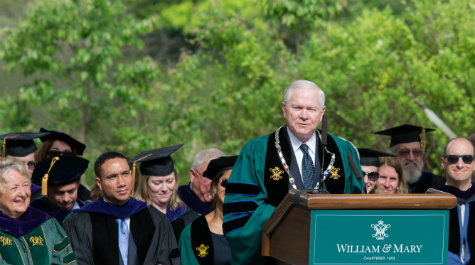Gates Urges Law Graduates to Spend Time in Public Service
Former Secretary of Defense and William & Mary Chancellor Robert M. Gates urged the Law School's Class of 2015 to embrace public service as one of the "duties and responsibilities that come with citizenship" in his address at the Law School's May 17 diploma ceremony.
Speaking to the approximately 220 J.D. and LL.M. graduates who gathered for the early morning ceremony at Lake Matoaka Amphitheatre with friends and family members, Gates said he was honored by the invitation to speak and would "return the favor " by keeping his remarks brief. "I promise, your smartphones will still have a charge when I am done," he said to appreciative laughter.
While it is well known that the Law School provides "first rate" education and professional training, he said, "what makes William & Mary special, in my view, is the opportunity to be a part of an institution rooted in the earliest history and fundamental governing experience of the United States." The college established the nation's first law school, he reminded his audience, and counts among its earliest law students Chief Justice John Marshall. He quoted the school's first law professor, George Wythe, a signer of the Declaration of Independence, who wrote that the school's mission was to educate leaders for the fledgling nation. "The intersection of law, liberty, and history defines the William & Mary experience," said Gates.
The Class of 2015 did not suffer from any lack of "public mindedness," he noted, as evidenced by their record-breaking participation in the class gift, community endeavors such as Constitutional Conversations, and the thousands of pro bono hours contributed by students and managing attorneys in the school's clinics. "I am especially proud that William & Mary is the home of the Puller Law Clinic," which has become, Gates said, a nationally recognized model for its work with veterans.
"No doubt, many in this class – whether your political persuasion leans toward the Federalist Society or the ACLU – will continue to devote unpaid time and effort to causes you believe in, whether through pro bono or volunteer work," he said. "But I hope you will take things one step further, and consider devoting at least part of your professional life to full-time public service."
He acknowledged that public servants face many challenges – from cynics who dismiss their role, labeling them as bureaucrats, to fatigue from navigating a system of government that upholds liberty but is "by design, slow and unwieldy," and from personal attacks that seek to silence their points of view. "Public life can seem too mean, too ugly, too risky, too dangerous, and too frustrating," he said.
Gates, who is a recipient of the Presidential Medal of Freedom, the country's highest civilian honor, countered those notions with a perspective informed by his years working at the CIA, the National Defense Council, and the Department of Defense, and with eight presidents: "I believe that public service remains a necessary and honorable calling, and contrary to the perceptions of many, a fulfilling and satisfying opportunity."
He quoted President John Adams on the potential ills visited on society if citizens shrank from public service. In a letter to one of his sons, Adams wrote: "Public business ... must always be done by somebody. It will be done by somebody or another. If wise men decline it, others will not; if honest men refuse it, others will not."
Gates concluded his remarks with the observation that the foundations of democracy rest on citizens' "preparedness to serve, devotion to one's community and fellow citizens, caring beyond self."
"Our forebears who walked these grounds more than two centuries ago understood this when they risked their lives, their fortunes, and their sacred honor. But it is a lesson that must be refreshed in every generation by the best and brightest young Americans. It is a lesson that must be refreshed by the wise and honest among you."
About William & Mary Law School
Thomas Jefferson founded William & Mary Law School in 1779 to train leaders for the new nation. Now in its third century, America's oldest law school continues its historic mission of educating citizen lawyers who are prepared both to lead and to serve.
